- Home
- Richard Matheson
Other Kingdoms Page 5
Other Kingdoms Read online
Page 5
“Well, let it go,” he said.
“No!” I shook my head determinedly. “Let me have it. All of it.”
* * *
Their realms are Neverland, Eden, Emhain, Middle Earth, and much more. (Joe told me; I believe it was Joe, maybe not.)
They move through the woods, usually unseen.
They are solitary, rarely meeting with humans.
They can shape-shift, often appearing as animals. I had a big problem with that one.
They can make grass move and leaves rustle without a breeze. (That got to me.)
They can intrude on thoughts. (As did that.)
They can appear to you if you keep an open mind.
They are intrigued by people though avoiding them.
They are generally distrustful and disgusted by human behavior. (That I could believe even if I couldn’t believe in faeries, whatever the hell they were.)
How could I detect them? (1) A sudden trembling of leaves. (2) Sudden gooseflesh. (3) Loss of time. All three made me think. Those things occurred.
* * *
“I know you’d rather not,” Joe finished. “But if you want to see them, spend a lot of time sitting in nature, meditating.” I was surprised he knew that word. “Do something creative.” (Where did that come from? I wondered.) “Stay clean. Sing a lot.”
Stay clean? I thought. In Comfort Cottage? And sing a lot? I had little voice. If I did believe these things, my singing would scare the hell out of any little people within listening range.
“All right,” I said, still not giving up. “What do I look for? What do they look like?”
A mistaken query. They could look like anything, he told me. Great, I thought, here it comes. It depends on their whims. A tree? Why not? A firefly? Of course. A dwarf or a mermaid? Sure. A flower, a plant? Indeed. Jesus God in downtown Pandemonium! I raged within. How could I possibly believe what Joe was saying? He’d gone too far. His explanations were ridiculous. Ridiculous!
Only one thing bothered me. “Avoid middle—,” Harold had said before he died. I’d been trying to guess “the middle of what.” Had he meant Middle Earth? Was that it, after all? If so, why?
* * *
I tried to keep myself as clean as possible. Not because of what Joe said, but simply because I’d been raised that way. Mother always looked immaculate. Veronica always smelled as sweet as a rose. The Captain? Obviously adhering to naval regulations—clean as a damn whistle. So it was my training—by example, not regulation. The average teenage boy sloppiness did not exist in me. The average teenage boy anything was missing, I regret to say. Which is why I was so cool and critical about everything. But especially about Joe’s admonitions.
I did not sit around a lot, meditating. God knows I did not sing a lot. If Joe’s words had rung true to me, I might have vocalized night and day on the premise that my froglike tenor would keep the wee folk far away from me in droves. What I did—and I swear it was not for fairy-precaution—was consider the creative suggestion. I had for some years—since I was fifteen, as I remember—harbored the secret notion of trying to become a novelist. When I was twelve, maybe thirteen, I launched from said harbor a vessel of poetry authorship. A vessel completely unseaworthy, I hasten to add. No verser, living or dead, had a thing to worry about. A sample? When Columbus sailed, he said, “At least—I’ll find a short route to the East.” Beyond that, it got really atrocious. Not to me, of course. I was a cocky twelve-year-old. Nothing got through to me. Especially when Mother praised my attempt. Veronica, more honestly, wasn’t sure that I was treading on the heels of Robert Browning—or Jim Browning, who, at the time, murdered his mother and wife, and prior to his hanging, wrote a poem that began, Mother, mother, why did I smother—you and Geraldine?—That was mean. In brief, I gave up poetry (I never showed anything to Father) and retreated to reading Gothic novels. Odd, I never before attributed Arthur Black’s subject matter to that.
So there I was, eighteen, with a hidden agenda in mind. An agenda for which Joe had inadvertently stirred the coals, igniting flames. I say “inadvertently” because I know that Joe was unaware of my undeclared ambition; he meant only to advise—and warn—me of the mystical world “out there.”
So—fool that I was—I commenced to write a novel. I blush to reveal the title: Terror in the Trenches. That was the best one. I refuse to tell you what the others were. It had to do with a young man—odd choice?—who, assigned to the Gallic trenches, proceeded—personally—to decimate the entire Boche Army. I did manage to include some of the more graphic truths about trench life—rats devouring dead bodies, for instance—but fundamentally, the story was one of unabated heroics and finally, graphic demise on the bayonet of a chortling German. The book was fifty-seven pages long, and that was too much. Review? One word. Godawful. I planned—eighteen and brainless—to submit it to the primo publishers in New York—I’d show the damned Captain!—or, if necessary (most unlikely, I truly believed) London. Fortunately—thank God for the literary world—I never sent it anywhere. Rats (I’m not sure, now, it was rats) chewed up the manuscript. Breaking my author’s heart, but now, at eighty-two, a source of profound gratitude. I will say that the wheels did begin to turn, later installed on the Arthur Black hearse. The rats—was it rats?—did me a favor.
* * *
The next peculiar incident took place a week or so after I had surrendered the notion of becoming a world-renowned novelist. My life, in those days, seemed peculiar in every respect. Certainly, this one was.
It was late night. I was asleep on my pallet—by then I was accustomed to it. Suddenly, (to quote Arthur Black at his worst) there was a pounding on the door below. I woke up with a jar. Who in the hell? I thought. Did fairies knock? Didn’t they just come gliding through the walls? In a state of groggy amusement, I struggled to my feet, managed to descend the ladder without falling to my death, and approached the door, which—did I tell you?—Joe had rehung. All this time, the pounding persisted, accompanied by a faint voice commanding me to “Open up!”
I did as commanded, to see a sight I treasure to this moment: A sweaty, wild-eyed Mr. Sedate Face, whose face, far from sedate, was twisted with fury, teeth bared. “Mr. Brean,” I muttered.
“Don’t ‘Mr. Brean’ me!” he shouted.
“What?” I asked, unable to think of anything else.
“Don’t ‘what’ me, you thieving bastard!” screamed Mr. Brean. That’s right. Screamed. So loud, I jerked back as if from a blow to my solar plexus. (What my father called the stomach.)
“What the hell?” I asked. Not him, probably the universe.
“As if you didn’t know!” he yelled.
Now I was getting peeved. Though “peeved” would hardly be the word for Mr. Brean’s apoplectic rage. “Know what?!” I cried, demanded.
“I suppose you just don’t know,” he bellowed.
“No, I don’t!” I bellowed back. “Why the fuck don’t you tell me?!” I was not inclined to use bad language, but his behavior maddened me.
A heavy stillness fell on Comfort Cottage. I could use a fucking fairy! I thought, thoroughly incensed.
“I’m not sure you do know.” Mr. Brean’s voice was close to human now. Then his features distended again. “No, you do know,” he recanted. “You’re trying to trick me again!”
“And how am I doing that?” I asked, very angry now.
He stood motionless and sweaty for a number of seconds. Then he bared his teeth again, reached into his overcoat pocket—must be cold outside, my mind commented irrelevantly—and drew out a small cloth packet, tied with a knot. It took him near to a minute to unknot it and part two edges of the cloth. I looked down at the contents.
Then looked up at him. He’s gone insane, was my conclusion.
“Well?” he said in a cracking voice.
“Well what?” I retorted, “What?!”
“I suppose you don’t know what it is,” he said; his voice was cracking again. I was beginning to feel sorry for him, he
was so pitifully overwrought.
“Damn you!” he erupted then. “Don’t tell me you don’t know what it is!”
I no longer felt sorry for him now. I felt abrupt concern for my existence. “I don’t know what it is,” I told him, as controlled as I could.
“I want my money back,” he said in a trembling, threatening mutter.
“Your money?” I had no idea where that remark came from.
Then it hit me. “Are you telling me that this is—?” I began.
“Yes!” He didn’t let me finish. “It is!” He overturned the cloth.
Drizzling to the floor was a cloud of gray dust.
I stared down, not seeing much, because there was no light in the room. I could not comprehend what I’d seen. Was Brean serious? “You’re telling me—?” I started.
Again, he interrupted. Rabidly. “I’m telling you! You sold me gold! All that’s left is dust!”
“I don’t understand,” I told him weakly.
It seemed as though he shuddered in the darkness. “I think you do,” he said, “and I want my money back or I’ll see you behind bars for the rest of your life.”
I could only stare at him.
Dust? Gray dust?
There was no further conversation. (Had it been a conversation?) Without another word, Mr. Brean whirled and vanished into the night. Leaving one pathetic would-be novelist in a state of absolute confusion. In the morning light—not that I slept a wink from Mr. Brean’s departure to the arrival of the sun—I examined the layer of dust on the downstairs floor. “Examined” is an overstatement. My inspection was tentative, gingerly. For the life of me, I was unable to fathom how a lump of gold (hadn’t Brean—a jeweler—identified it as such?) could be reduced to a pile of dust. Gray, at that.
My confusion was not undone by a visit from Joe that a.m. Mr. Sedate Face was dead, the victim—apparently—of a heart attack. I was spared the prospect of a long gaol sentence. (That’s how they spelled “jail” in those days.) An uncharitable reaction, I concede. But Brean was really nasty to me. Furthermore, I was innocent of any wrongdoing, fully as thunderstruck by the incredible transformation of gold to dust.
So I swept up what was left of my lump of gold and fed it to the lizard fern.
Chapter Nine
Next peculiar incident; onward with my wacko tale. Wacko but, I assert once more, completely true. I had decided, by then, that Mr. Sedate Face had either gone completely mad, or was already mad. Would I have noticed in the pub that afternoon if I hadn’t been intent on selling him the gold? More plausibly, of course, he had devised a plan to get his money back and keep the gold as well. Precious metal into powdery dirt? Nonsense. Brothers Grimm stuff.
Where was I? Yes. I decided to take a walk. No, not sidestepping into the woods—although, by then, I had deduced a “rational” explanation for that incident as well. But better safe than superstitious. As per Joe’s advice, I’d remain on the path. Okay. Well done. A walk on the path, no more.
That was my plan, at any rate. Which I observed in the beginning, not even pausing by the other path to see if the white feather was still there. Idiotic if I had, my mind declared without hesitation. Why would a feather remain in place? A feather, for God’s sake? Subject to any random breeze? That was—
Before my mind could present the word “ridiculous,” I heard a voice calling to me. “Young man!”
I confess to several moments of good sense reversal, several moments of pure primitive dread. It’s a fay-erie! cried my momentarily disabled brain, awareness clobbered. That’s how I thought it was pronounced.
To my credit, I fought it off. Don’t be absurd, I ordered myself; it was not a damn fay-erie! And, with that, I abruptly recalled what I imagined (or thought I imagined) my last day on the path; again, a voice calling me, the words indistinct.
I forced myself to turn. Another moment of temporary trepidation (good phrase, that). Then, once more, bathing my mind with satisfaction, rationality returned. (Not so good a phrase.) It was a woman standing near the foot of the path. A tall red-haired woman dressed in most un-fay-erielike clothes, such as might be worn by any female resident of Gatford. Not a tiny, winged, transparently gowned fay-erie. Well, Joe did say they could shape-shift, my maddening brain insisted on recalling. Oh, shut up! I told my maddening brain.
“Come over here,” the woman said, her voice and smile inviting.
Oh, damn, I thought. Isn’t that the sort of invitation one would expect from the “wee folk”? I had to fight that off as well. I didn’t move, however. I remained fixed in place.
Amazing how a few well-spoken words can totally undo the superstitious angst of any given moment. That was the exact result of what the woman said to me. “Don’t worry, I’m not a faerie. I’m a real person.”
Something was released in me, like an unblocked flow of water, fresh, invigorating water. Returning the woman’s kind smile, I approached her. “There, that’s better,” she said, sounding relieved.
“I’m sorry, I apologize,” I felt obligated to say.
“Not at all,” she said, excusing my dubious behavior. “I don’t know how long you’ve been in Gatford, but if any time at all, you’ve undoubtedly been exposed to local old wives’ tales.”
Or old roofers’ tales, I thought. I returned her renewed smile—it was a lovely smile (on her part, I mean, I don’t know about mine) and said, “I have. A lot of them.”
“Too bad,” she responded. “They can be overdone.”
Indeed, I thought. “They can,” I agreed.
Another smile—completely lovely—as she extended her hand for shaking. “I’m Magda Variel,” she said.
“Alex White,” I told her. Her grip was comforting, her palm warm against mine.
“I’m very pleased to meet you, Alex,” she said.
I nodded. “Thank you,” I repeated. Why did you say that? I questioned myself. Not very gracious. Immediately, I added, “I’m glad to meet you.” Glad? I questioned my brain again. You mean “pleased,” don’t you? Well, what the hell; I let it go. How old was she, anyway?
“Would you like to see where I live?” she asked.
Again, my provoking brain came up with several vexing ideas: The witch inviting Hansel and Gretel into her gingerbread house. A shape-shifted faerie luring me to Middle Earth. A crazy woman asking me to visit in order to dissect me? In one piece, Joe had said.
God, it was hard to fight that off! Near impossible. But I did it, more power to my teenage strength of character—or denseness. I wouldn’t do it now. I was uncomfortable.
Through all this, Magda, the lovely (she was lovely, I realized), tall, red-haired woman, waited patiently, saying finally, “Still uneasy?”
“No,” I lied.
“Come, let me take your arm, then,” she said, taking my arm. I positively shuddered. “Lord, you are afraid,” she said. “I’m sorry. Would you rather not do this?”
“No, I’m sorry,” I lied again, “I have been exposed to too many old wives’ tales.” (“To too”—Arthur Black would have shuddered at that ugly combination; but I was only eighteen, what did I know?)
“Yes, you have,” Magda Variel responded. “Far too many.”
“Onward, then,” I said bravely (at least sensibly).
We walked together into the woods. If A. Black had written that sentence in one of his shock boilers, it would have presaged ghastly events. As it was, our entrance into the silent woods presaged nothing. I thought.
“So tell me,” I said, “these old wives’ tales. Are they all nonsense?”
“Not all,” she answered casually. Evoking another involuntary shudder by her very vulnerable (not too bad a phrase, not too outstanding either) teenage companion. “You’re still afraid,” she said.
“I guess I am, a little,” I admitted. “This has been a most unusual month. I’m trying to deal with it. But it hasn’t been easy.”
“I understand,” she said. “My first year here was very trying—all the
stories people told me—that they swore were true.”
“But you said they aren’t all nonsense,” I reminded her.
“That’s right, they’re not,” she told me, “but nothing to be alarmed about.”
“Fay-eries,” I said, “the way I say it. Faeries, then. Do they really exist?”
“Oh, they exist,” said Magda, not realizing that she chilled my bones with the reply. “Not so plentiful as many Gatfordites would have you believe. But some of them are real hooligans mostly. Fooligans.”
“Fooligans?” Despite my uneasiness, the word amused me.
“Hooligans who like to fool you,” Magda said. “I made up the word.”
That evoked a snicker from me. “How do they fool you?” I asked.
“Oh, many ways,” she answered. “Taking things away from you. Bringing unexpected things to you. Making trees or bushes shake. Oh, now you’re frightened again,” she said, reacting to my reflex shudder.
I told her about my experience by the stream that past afternoon. She agreed with me that I had probably misinterpreted the abruptly rustling foliage. On the other hand, it might have been a faerie-induced stir. “If so,” she said, “you’re fortunate they teased you no more than that. They could have done you harm. They probably liked you, though, for some reason.”
“Well, I’m very likable,” I said, the thin waver of my voice revealing my actual emotion—minor terror at her words.
She smiled, knowing what I felt. “You are likeable,” she said, tightening her grip on my arm. I felt a warmth of gratitude for her sympathy. Like a mother, I thought. A beautiful mother.
“Just remember one thing,” she went on, “they cannot—will not harm you if you treat them with respect. If you want, I’ll give you several means of protecting yourself against possible intrusions.”
“Thank you,” I murmured. I was not exactly grateful to her. I would have preferred her to agree with my original estimation, that the entire subject was—sorry—bullshit. Or, as a later spokesman called it, bull pucky. But it wasn’t; if I were to accept Magda Variel’s words—and there was little reason at the moment not to do so.

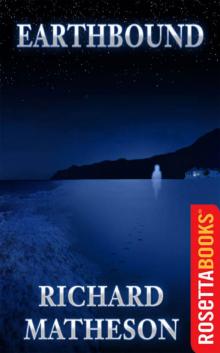 Earthbound
Earthbound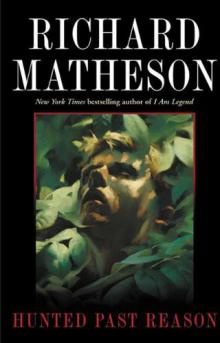 Hunted Past Reason
Hunted Past Reason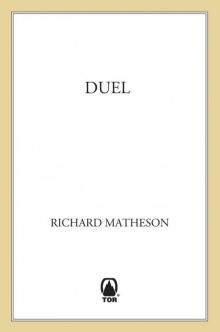 Duel: Terror Stories
Duel: Terror Stories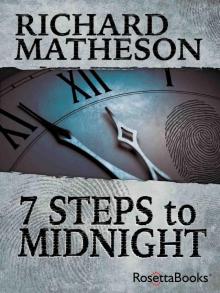 7 Steps to Midnight
7 Steps to Midnight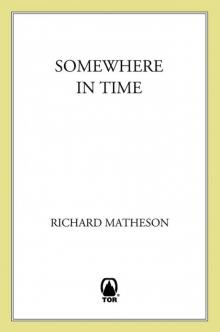 Somewhere in Time
Somewhere in Time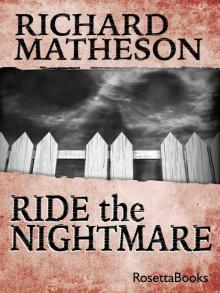 Ride the Nightmare
Ride the Nightmare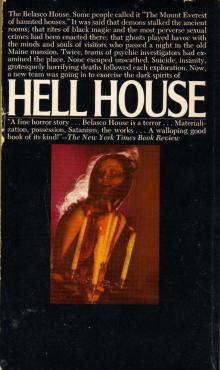 Hell House
Hell House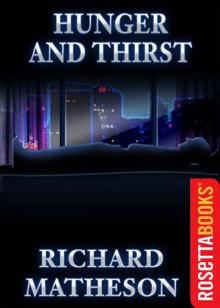 Hunger and Thirst
Hunger and Thirst Lyrics
Lyrics Other Kingdoms
Other Kingdoms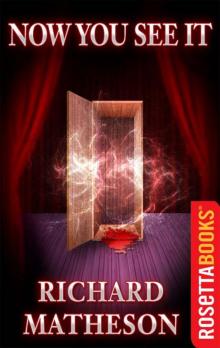 Now You See It . . .
Now You See It . . .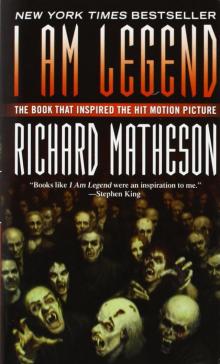 I Am Legend
I Am Legend The Box: Uncanny Stories
The Box: Uncanny Stories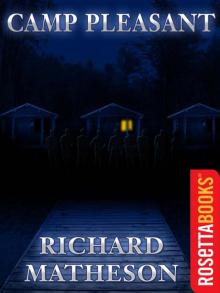 Camp Pleasant
Camp Pleasant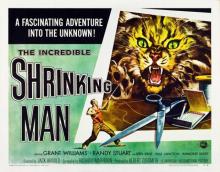 The Incredible Shrinking Man
The Incredible Shrinking Man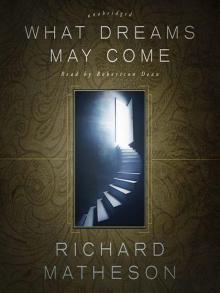 What Dreams May Come
What Dreams May Come The Gun Fight
The Gun Fight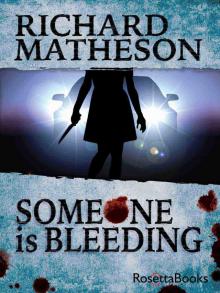 Someone Is Bleeding
Someone Is Bleeding Mediums Rare
Mediums Rare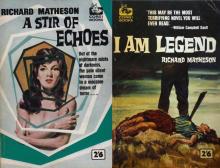 A Stir of Echoes
A Stir of Echoes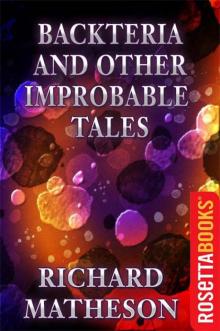 Backteria and Other Improbable Tales
Backteria and Other Improbable Tales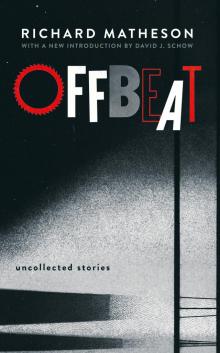 Offbeat: Uncollected Stories
Offbeat: Uncollected Stories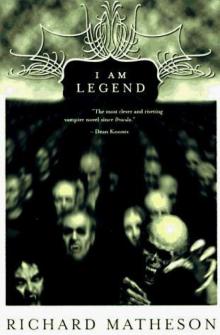 I Am Legend and Other Stories
I Am Legend and Other Stories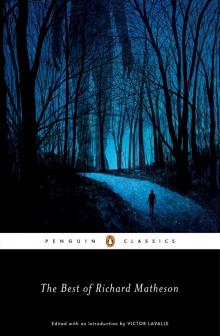 The Best of Richard Matheson
The Best of Richard Matheson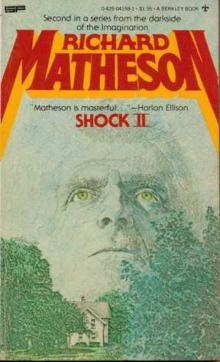 Shock II
Shock II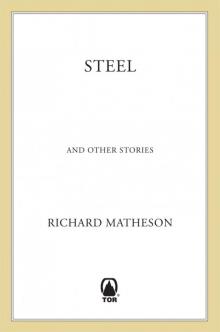 Steel: And Other Stories
Steel: And Other Stories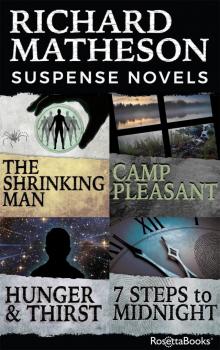 Richard Matheson Suspense Novels
Richard Matheson Suspense Novels The Link
The Link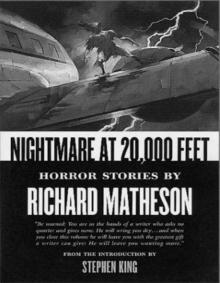 Nightmare At 20,000 Feet
Nightmare At 20,000 Feet Shadow on the Sun
Shadow on the Sun![Steel and other stories [SSC] Read online](http://i1.bookreadfree.com/i/03/21/steel_and_other_stories_ssc_preview.jpg) Steel and other stories [SSC]
Steel and other stories [SSC] Created By
Created By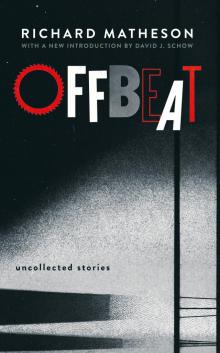 Offbeat
Offbeat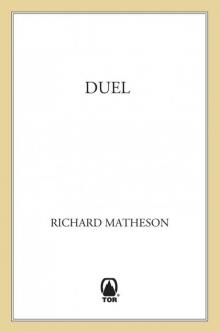 Duel
Duel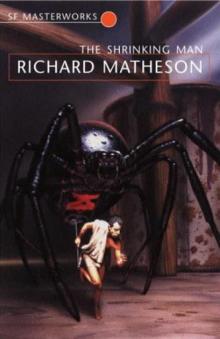 The Shrinking Man
The Shrinking Man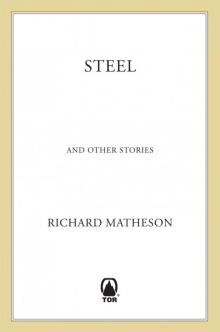 Steel
Steel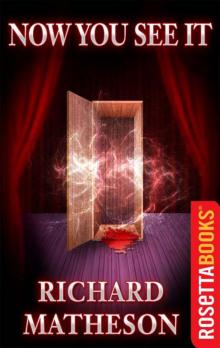 Now You See It
Now You See It